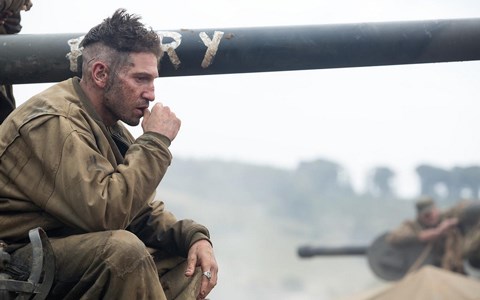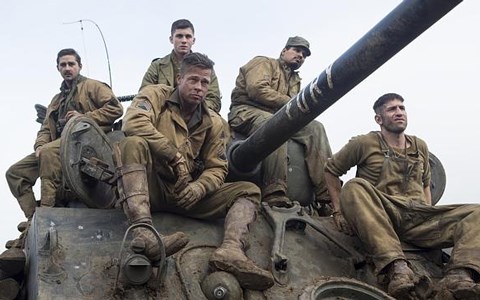
Top stories






More news












Logistics & Transport
Maersk reroutes sailings around Africa amid Red Sea constraints



Fury takes place in late-war Germany, 1945. "The war's almost over and this dying elephant - the Nazi empire - is on its last legs," Ayer explains. "It's a different world from your usual war movie, where we celebrate victorious campaigns like the invasion of the European continent, or D-Day, or The Battle of the Bulge, these famous battles that American troops have taken part in. One of the forgotten time periods is this last gasp of the Nazi empire, with an American army that has been fighting for years and is on its last reserves of manpower. The men are exhausted. In World War II, you fought until you either won or died, or were grievously injured and got sent home. The fanatical regime is collapsing, it's a confusing environment where anyone can be the enemy - it's incredibly taxing on the fighting man's soul."

It is into this environment that Ayer created the character of Don 'Wardaddy' Collier, with Brad Pitt delivering another memorable performance. "Wardaddy is the tank commander - his responsibility is keeping his men alive," Pitt says. "He's responsible for their operations, their morale, and especially making sure that they are operating as a machine. His calls are going to determine who walks away and who doesn't. But, at the start of the film, they've lost one of their five members, and a new kid is thrown into our family. It's not just that he's new, it's not just that he has no tank experience - he's actually a threat to our survival; if he can't perform the whole crew is in danger and people will die. He comes in with great innocence, and the question is, how do you raise a child in a day? Wardaddy has to get him calloused and get him performing, to ensure the safety of others.
"I was a David Ayer fan from his previous work, especially End of Watch," says Brad Pitt, who takes the lead role of Don 'Wardaddy' Collier in Ayer's new film, Fury. "Knowing the depths he goes to for realism and authenticity, and his unique structure, I find him to be one of the standouts. He's also a vet, and from that first-hand experience, he has a wealth of knowledge on the subject that drew us all in."
Into Wardaddy's platoon comes Norman Ellison, a young man woefully unprepared for war. "Norman represents the audience in the film," says Logan Lerman, whose passionate performance is heartbreaking at times.
"He's the new kid with almost no military training, and it's through his eyes that we learn about the tank, the grammar and the story of the movie. It's his story of acceptance; his journey is the core of the film."
"In a lot of ways, Norman is the son that Wardaddy never had," says Ayer. "He mentors Norman, parents him, guides him to become an effective soldier. Norman is young and fresh and innocent, and that makes him endearing, but it's also the problem he must overcome. Wardaddy must break him of his innocence."
Ayer says that in the closing days of World War II, it was not unusual for very young and very unprepared men to be thrust suddenly into battle on the front lines. "After The Battle of the Bulge, the US.was short on manpower, so they'd give these guys sometimes as little as three or four weeks of combat training, and pack 'em up and send 'em into war," he notes. "Norman is very unprepared for what's happening, and he becomes their hostage, in a way, as he's thrown into this steel cage and dragged across the fields of Germany into combat. Norman ends up in situations that he's absolutely not equipped for, and it's Wardaddy's job to train him, to get him to overcome the civilian's sense of right and wrong."
In Fury, Ayer has drawn a similarly complex relationship, as the bond that forms between the young Norman and the veteran Wardaddy forms the heart of the film.

Shia LaBeouf is equally brilliant in the role of Boyd Swan. "He's the gunner and basically the second-in-command of the Fury," says the actor. "He operates the main gun system, the 76mm high-velocity cannon. He's a stone-cold killer, but he's also a man of faith - it's interesting for me to explore how a man who reads scripture and has faith - a Christian - reconciles that with being in combat."
After collaborating with actor Michael Peña on the film End of Watch, Ayer created the role of the tank's driver, Trini Garcia, especially for Peña. "I believe around 350,000 Mexican-Americans served in World War II, many of them as drivers in the Armoured Corps," Ayer notes. "He's a sophisticated guy, and back on the block, he'd be very much in charge - but in this situation, the exhaustion and the nerves and the stress, he's turned to alcohol to try to solve it. There was a lot of alcohol use in the army at that time, and he wouldn't be the first tank driver to be drunk driving."
"It's cool, despite his idiosyncrasies, he's paying homage to all of the Latinos that fought in World War II that were unacknowledged," says Peña. "My hat goes off to David Ayer - there were Latin guys who went to war and fought for their country, and it touched them, psychologically and physically."
Jon Bernthal rounds out the crew of the Fury as Grady Travis. "He crawled out of a swamp," says Ayer. "He's the kind of guy who was a Depression-era child, grew up without shoes on his feet, working since the age of eight on farms - he's just not equipped for the adventure he's been forced into by circumstances."

"If Wardaddy is the brains, Grady is the guts," Ayer continues. Ayer says that as the loader, he has a 'special relationship' with the gunner. "He's the guy shovelling coal into the furnace, the ammunition into this weapons system, and because of that they have a very close working relationship."
The intensity of the screenplay that Ayer wrote for Fury has become his hallmark, but the movie, like his screenplays for Training Day, The Fast and the Furious, and other films, also demonstrates a deep connection between the characters. "David's movies are visceral and real, but they're also deeply about brotherly love and friendship in the most extreme circumstances," says Block.
"Fury is not your grandfather's war movie," says producer Bill Block, who packaged the film for QED before Columbia Pictures picked up the distribution rights. "I don't think we've seen the physical horror that the armoured division went through. Outmanned and outgunned, they only won through true, raw fighting."
"No one writes about men at their most vulnerable the way David does," says producer John Lesher, who previously teamed with Ayer on his acclaimed film End of Watch. "In all of his films, I see some common themes: they are about brotherly love, friendship, fathers and sons, and some of these themes resonated quite heavily in this script."
Ayer tells that complex story through a deceptively simple structure. "The whole movie takes place in 24 hours, from dawn one morning to dawn the next day," notes producer Ethan Smith. "It's very straightforward in its construction, but very eloquent and complicated in its storytelling."
With his 2012 film End of Watch, Ayer garnered acclaim for a unique and provocative directorial style. With Fury, he takes a new step in his career, says producer Bill Block. "This is an evolution of David Ayer's style, a more formal and beautifully filmed picture," he says. "Where in End of Watch, he created a docu-video style, this film is a period piece that maintains his signature - intense reality."
"This is a distinctly David Ayer movie in the sense that it is a very authentic-looking war movie in its look and feel," says producer Ethan Smith. "David steeps himself in research and works closely with tactical and military advisors to get all the details right. His directing process includes surrounding himself with the best people from various disciplines to ensure accuracy."
Producer John Lesher says that the research pays off with characters and experiences that come to life on screen because they seem true to life. "I was so fascinated," says Lesher. "And he said: 'You should come to my office.' I saw the extensive number of books and research and thought that he had put into this story. I was duly impressed."
At the same time, Lesher says, Ayer wrote a screenplay that was relatable and true to any generation. "What I thought was so interesting and so compelling about this is that it felt very modern," Lesher says. "Yes, it's about World War II, and all the specificity and all the authenticity and all the research that David did really comes to life in the script. But it's really about men at war."
Kevin Vance, one of the military technical advisors on the film, says that the commitment to realism meant a commitment to a furious, visceral film unlike any WWII film that has come before. "In most World War II movies, we have this association with 'the good war' - and it is," he says. "But over 60 million people died in World War II. That's a dichotomy that hasn't been fully explored, and that's what David demanded of this film."
Read more about Fury and other films opening this week at www.writingstudio.co.za
